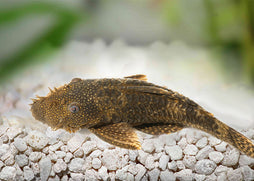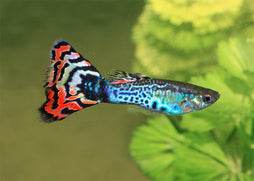Description
The Lionhead goldfish is a captivating ornamental species known for its distinct physical appearance and unique behavioral traits. Originating in China, this variety of goldfish is prized for its rounded body, long flowing fins, and the notable fleshy growth on its head, resembling a lion’s mane. Lionhead goldfish are relatively hardy, but their specific care requirements must be met to ensure their well-being.
Shop live aquarium fish online with confidence, with our livestock delivery guarantee.
Features of a Lionhead
-
Round, compact body shape.
-
Prominent, fleshy head growth (known as a "hood") that becomes more pronounced with age.
-
Bright orange or red coloration, though other colors may appear.
-
Lack of dorsal fin, contributing to its distinctive appearance.
-
Long, flowing pectoral and caudal fins.
-
Peaceful, calm temperament.
-
Can grow up to 15-20 cm in length.
The Best Aquarium Size for Lionhead
A minimum tank size of 75-100 liters is ideal for a single Lionhead goldfish, providing ample space for movement and growth. Larger tanks are recommended if housing multiple fish to ensure water quality remains optimal and reduce stress.
After an Aquarium for your fish? Browse our Aquarium Tank Selection here.
Tank Mate Compatibility for Lionhead
Lionhead goldfish are generally peaceful and can be housed with other non-aggressive species that share similar water requirements. However, avoid aggressive or fast-swimming species, as they may outcompete the Lionhead for food. Suitable tank mates include:
Diet for Lionhead
Lionhead goldfish are omnivores and thrive on a varied diet. Offering a combination of high-quality pellets, flakes, and live or frozen foods will provide them with the essential nutrients for growth and vitality. They enjoy:
-
Commercial goldfish pellets or flakes.
-
Daphnia (water fleas), brine shrimp, or bloodworms.
-
Blanched vegetables such as peas, spinach, or zucchini.
After an Aquarium for your fish? Browse our Aquarium Tank Selection here.
Aquarium Setup for Lionhead
Aquarium Filtration
Lionhead goldfish produce significant waste, making efficient filtration crucial for maintaining water quality. A strong, reliable filtration system capable of processing at least four times the tank’s volume per hour is recommended. Consider a canister filter or a high-performance hang-on-back filter.
Browse aquarium filters here.
Aquarium Plants
Live plants help oxygenate the water and provide hiding spots. Opt for hardy, non-toxic species that can withstand the moderate water conditions goldfish prefer. Suitable plants include:
-
Anubias
-
Java Fern
-
Amazon Sword
Interested in live plants for your aquariums? Browse live plants here.
Aquarium Lighting
Lionheads do not require intense lighting. A moderate amount of light for 10-12 hours a day will help regulate their day-night cycle and encourage plant growth. LED aquarium lights with adjustable intensity are a good choice.
Need aquarium lighting for your fish tank? Browse our Aquarium Lighting.
Aquarium Heating
Goldfish prefer cooler water temperatures, typically between 18-22°C. A heater is generally not needed unless the ambient temperature falls below this range. In colder climates, ensure the water temperature is stable and within the optimal range.The water pH level should be between 6.0 to 8.0.
Looking for a suitable fish tank heater? Shop aquarium heaters here.
Aquarium Substrate
Lionhead goldfish have a tendency to forage along the substrate, so smooth, fine gravel is recommended. Avoid sharp or jagged stones that may injure their delicate fins and mouth.
Shop a variety of Aquarium Substrates here.
Aquarium Decorations
Simple decorations, such as caves, rocks, and driftwood, provide hiding spots and a natural environment. Ensure that any decorations are free of sharp edges that could harm the fish.
Check out our huge range of Aquarium Ornaments











